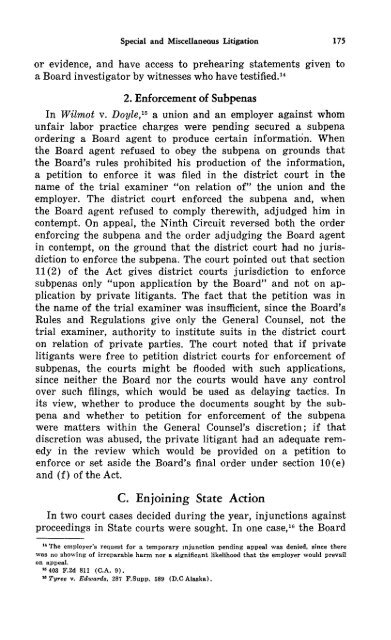1 - National Labor Relations Board
1 - National Labor Relations Board
1 - National Labor Relations Board
Create successful ePaper yourself
Turn your PDF publications into a flip-book with our unique Google optimized e-Paper software.
Special and Miscellaneous Litigation 175<br />
or evidence, and have access to prehearing statements given to<br />
a <strong>Board</strong> investigator by witnesses who have testified.'4<br />
2. Enforcement of Subpenas<br />
In Wilmot v. Doyle, 15 a union and an employer against whom<br />
unfair labor practice charges were pending secured a , subpena<br />
ordering a <strong>Board</strong> agent to produce certain information. When<br />
the <strong>Board</strong> agent refused to obey the subpena on grounds that<br />
the <strong>Board</strong>'s rules prohibited his production of the information,<br />
a petition to enforce it was filed in the district court in the<br />
name of the trial examiner "on relation of" the union and the<br />
employer. The district court enforced the subpena and, when<br />
the <strong>Board</strong> agent refused to comply therewith, adjudged him in<br />
contempt. On appeal, the Ninth Circuit reversed both the order<br />
enforcing the subpena and the order adjudging the <strong>Board</strong> agent<br />
in contempt, on the ground that the district court had no jurisdiction<br />
to enforce the subpena. The court pointed out that section<br />
11(2) of the Act gives district courts jurisdiction to enforce<br />
subpenas only "upon application by the <strong>Board</strong>" and not on application<br />
by private litigants. The fact that the petition was in<br />
the name of the trial examiner was insufficient, since the <strong>Board</strong>'s<br />
Rules and Regulations give only the General Counsel, not the<br />
trial examiner, authority to institute suits in the district court<br />
on relation of private parties. The court noted that if private<br />
litigants were free to petition district courts for enforcement of<br />
subpenas, the courts might be flooded with such applications,<br />
since neither the <strong>Board</strong> nor the courts would have any control<br />
over such filings, which would be used as delaying tactics. In<br />
its view, whether to produce the documents sought by the subpena<br />
and whether to petition for enforcement of the subpena<br />
were matters within the General Counsel's discretion ; if that<br />
discretion was abused, the private litigant had an adequate remedy<br />
in the review which would be provided on a petition to<br />
enforce or set aside the <strong>Board</strong>'s final order under section 10(e)<br />
and (f) of the Act.<br />
C. Enjoining State Action<br />
In two court cases decided during the year, injunctions against<br />
proceedings in State courts were sought. In one case, 1° the <strong>Board</strong><br />
" The em ployer's request for a temporary injunction pending appeal was denied, since there<br />
was no showing of irreparable harm nor a significant likelihood that the employer would prevail<br />
on appeal.<br />
'4O3 F.2d 811 (C.A. 5).<br />
16 Tyree v. Edwards, 287 F.Supp. 589 (D.0 Alaska).

















